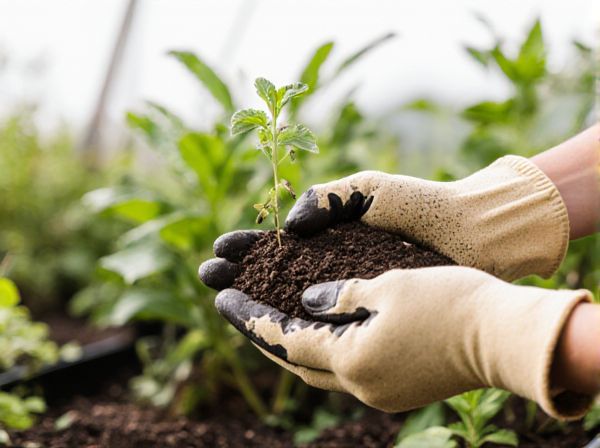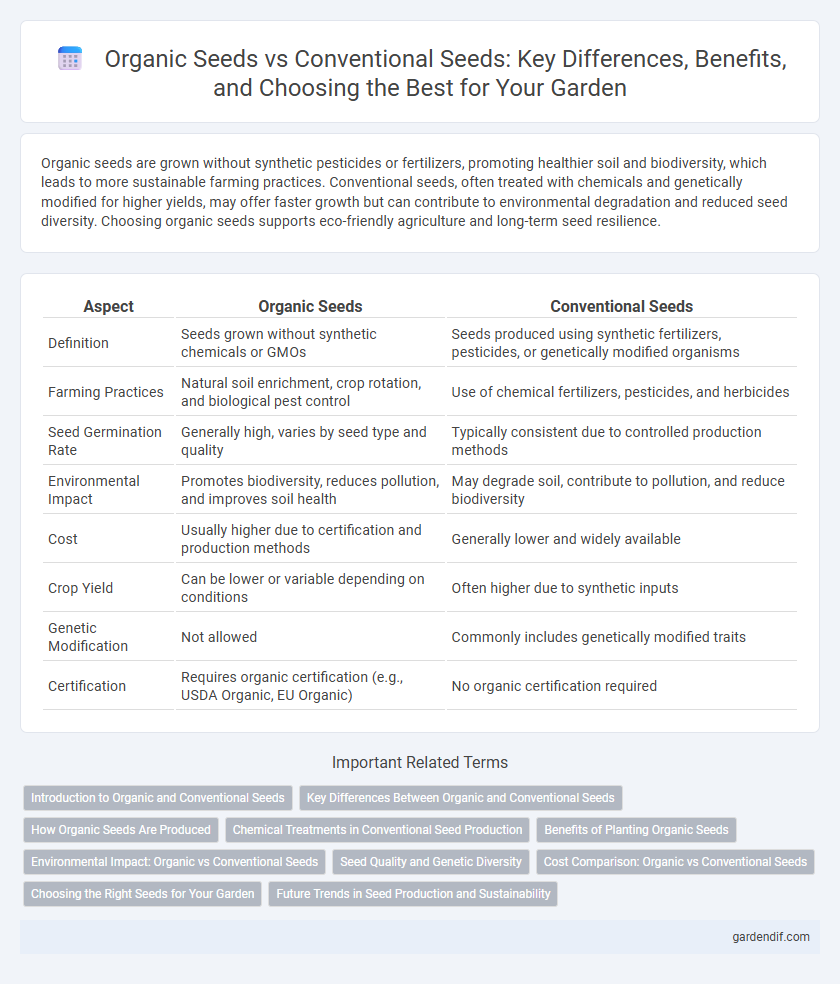
Organic seeds vs Conventional seeds Illustration
Organic seeds are grown without synthetic pesticides or fertilizers, promoting healthier soil and biodiversity, which leads to more sustainable farming practices. Conventional seeds, often treated with chemicals and genetically modified for higher yields, may offer faster growth but can contribute to environmental degradation and reduced seed diversity. Choosing organic seeds supports eco-friendly agriculture and long-term seed resilience.
Table of Comparison
| Aspect | Organic Seeds | Conventional Seeds |
|---|---|---|
| Definition | Seeds grown without synthetic chemicals or GMOs | Seeds produced using synthetic fertilizers, pesticides, or genetically modified organisms |
| Farming Practices | Natural soil enrichment, crop rotation, and biological pest control | Use of chemical fertilizers, pesticides, and herbicides |
| Seed Germination Rate | Generally high, varies by seed type and quality | Typically consistent due to controlled production methods |
| Environmental Impact | Promotes biodiversity, reduces pollution, and improves soil health | May degrade soil, contribute to pollution, and reduce biodiversity |
| Cost | Usually higher due to certification and production methods | Generally lower and widely available |
| Crop Yield | Can be lower or variable depending on conditions | Often higher due to synthetic inputs |
| Genetic Modification | Not allowed | Commonly includes genetically modified traits |
| Certification | Requires organic certification (e.g., USDA Organic, EU Organic) | No organic certification required |
Introduction to Organic and Conventional Seeds
Organic seeds are produced without synthetic fertilizers, pesticides, or genetically modified organisms, promoting environmental sustainability and biodiversity. Conventional seeds often involve chemical treatments and genetic modifications to enhance yield, pest resistance, and uniformity. Choosing between organic and conventional seeds impacts soil health, crop quality, and ecological balance in agricultural systems.
Key Differences Between Organic and Conventional Seeds
Organic seeds are produced without synthetic pesticides, fertilizers, or genetically modified organisms, ensuring natural growth and environmental sustainability. Conventional seeds often undergo chemical treatments to enhance germination and yield but may carry residues impacting soil and biodiversity. The key difference lies in organic seeds supporting eco-friendly farming practices, while conventional seeds prioritize high productivity through artificial inputs.
How Organic Seeds Are Produced
Organic seeds are produced through natural farming methods that exclude synthetic pesticides, herbicides, and genetically modified organisms (GMOs). Farmers use crop rotation, composting, and biological pest control to maintain soil fertility and plant health. Certification standards require seeds to be grown on organic land for multiple years to ensure purity and sustainability.
Chemical Treatments in Conventional Seed Production
Conventional seed production often involves chemical treatments such as fungicides, insecticides, and growth regulators to enhance seed performance and protect against pests and diseases. These chemicals can leave residues that may impact soil health and biodiversity, raising concerns about long-term environmental effects. Organic seeds are produced without synthetic chemicals, relying on natural methods to maintain soil fertility and crop resilience, ensuring safer and more sustainable agricultural practices.
Benefits of Planting Organic Seeds
Planting organic seeds promotes healthier soil by enhancing microbial activity and reducing chemical residues, leading to more sustainable agriculture. Organic seeds are free from genetically modified organisms (GMOs) and synthetic pesticides, ensuring safer, non-toxic crop production. This practice supports biodiversity and improves crop resilience against pests and diseases, contributing to long-term environmental balance.
Environmental Impact: Organic vs Conventional Seeds
Organic seeds promote biodiversity and soil health by avoiding synthetic pesticides and fertilizers, reducing pollution and minimizing harm to beneficial insects. Conventional seeds often depend on chemical inputs that can degrade soil quality, pollute water sources, and contribute to greenhouse gas emissions. Choosing organic seeds supports sustainable farming practices that mitigate environmental damage and enhance ecosystem resilience.
Seed Quality and Genetic Diversity
Organic seeds typically exhibit higher seed quality due to natural growing conditions that enhance nutrient content and seed vigor, promoting better germination rates and healthier seedlings. These seeds support greater genetic diversity because organic farming practices avoid synthetic chemicals, allowing for broader gene pools and increased resilience against pests and diseases. In contrast, conventional seeds often undergo intensive chemical treatments and selective breeding, which can reduce genetic variation and compromise long-term seed adaptability.
Cost Comparison: Organic vs Conventional Seeds
Organic seeds generally have a higher upfront cost compared to conventional seeds due to labor-intensive cultivation and certification expenses. Conventional seeds benefit from large-scale production and synthetic input use, resulting in lower prices and wider availability. Long-term investment in organic seeds can yield savings through healthier soil and reduced chemical input costs.
Choosing the Right Seeds for Your Garden
Organic seeds are cultivated without synthetic pesticides or herbicides, preserving natural biodiversity and promoting healthier soil ecosystems. Conventional seeds often undergo chemical treatments to enhance germination and resistance but may introduce harmful residues affecting long-term soil quality. Selecting organic seeds supports sustainable gardening practices and ensures a chemical-free start for your plants, fostering robust growth and environmental balance.
Future Trends in Seed Production and Sustainability
Organic seeds prioritize biodiversity and soil health, aligning with future trends emphasizing sustainable agriculture and reduced chemical use. Conventional seeds often focus on high yield and pest resistance, but face growing scrutiny for environmental impact and genetic uniformity. Emerging innovations in seed breeding and biotechnology aim to merge organic principles with enhanced productivity, fostering resilience and sustainability in future seed production.
Organic seeds vs Conventional seeds Infographic

 gardendif.com
gardendif.com